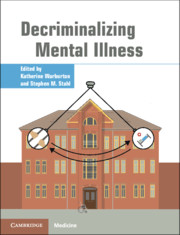Book contents
- Decriminalizing Mental Illness
- Decriminalizing Mental Illness
- Copyright page
- Contents
- Contributors
- Part I Introduction/Description of the Problem
- Part II Solutions
- Chapter 10 Jail Diversion: The Miami Model
- Chapter 11 Jail Diversion: A Practical Primer
- Chapter 12 Principles and Practices of Risk Assessment in Mental Health Jail Diversion Programs
- Chapter 13 Decriminalization in Action: Lessons from the Los Angeles Model
- Chapter 14 Economics of Decriminalizing Mental Illness: When Doing the Right Thing Costs Less
- Chapter 15 Decriminalizing Severe Mental Illness by Reducing Risk of Contact with the Criminal Justice System, Including for Forensic Patients
- Chapter 16 The Cal-DSH Diversion Guidelines
- Chapter 17 Decriminalizing Mental Illness: Specialized Policing Responses
- Part III Psychopharmacological Treatment Considerations
- Part IV Nonpsychopharmacological Treatment Considerations
- Part V Criminal Justice and Social Considerations
- Index
- References
Chapter 12 - Principles and Practices of Risk Assessment in Mental Health Jail Diversion Programs
from Part II - Solutions
Published online by Cambridge University Press: 19 October 2021
- Decriminalizing Mental Illness
- Decriminalizing Mental Illness
- Copyright page
- Contents
- Contributors
- Part I Introduction/Description of the Problem
- Part II Solutions
- Chapter 10 Jail Diversion: The Miami Model
- Chapter 11 Jail Diversion: A Practical Primer
- Chapter 12 Principles and Practices of Risk Assessment in Mental Health Jail Diversion Programs
- Chapter 13 Decriminalization in Action: Lessons from the Los Angeles Model
- Chapter 14 Economics of Decriminalizing Mental Illness: When Doing the Right Thing Costs Less
- Chapter 15 Decriminalizing Severe Mental Illness by Reducing Risk of Contact with the Criminal Justice System, Including for Forensic Patients
- Chapter 16 The Cal-DSH Diversion Guidelines
- Chapter 17 Decriminalizing Mental Illness: Specialized Policing Responses
- Part III Psychopharmacological Treatment Considerations
- Part IV Nonpsychopharmacological Treatment Considerations
- Part V Criminal Justice and Social Considerations
- Index
- References
Summary
Efforts are underway across the United States to reduce the population of individuals in our jails and prisons, such as through mental health diversion programs. Mental health diversion programs are now among the most common interventions for individuals with mental health problems who come into contact with the criminal justice system. Briefly, these programs divert individuals with mental health problems from traditional case processing into community-based behavioral health treatment and alternative case processing.
- Type
- Chapter
- Information
- Decriminalizing Mental Illness , pp. 115 - 126Publisher: Cambridge University PressPrint publication year: 2021

